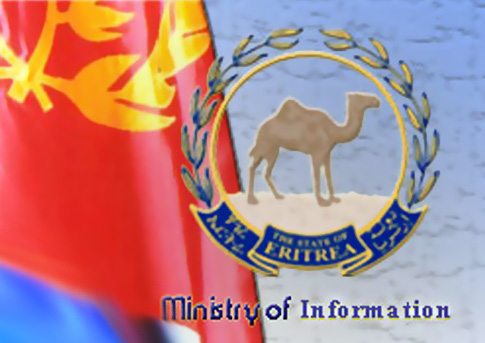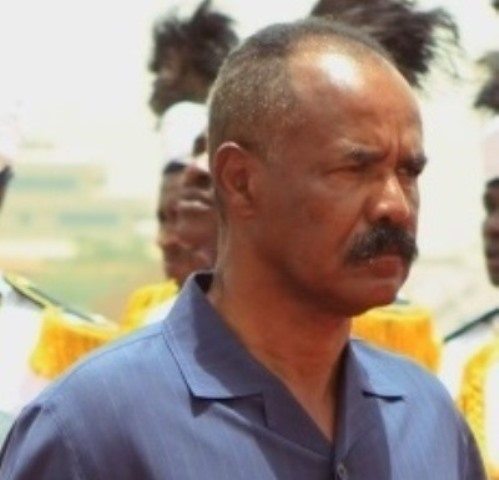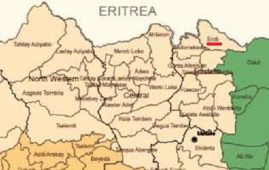IGAD – the Intergovernmental Authority on Development (IGAD) in Eastern Africa, is an important regional cooperation organ, though I barely discussed its activities thus far in this blog.
IGAD was first established as ‘Intergovernmental Authority on Drought and Development’ (IGADD) in Djibouti in January 1986 in response to the severe droughts and other natural disasters that affected the region in the 1970s and 1980s. Djibouti, Ethiopia, Kenya, Somalia, Sudan and Uganda took part in its founding, while Eritrea joined in 1993 soon after its secession from from Ethiopia.
the region in the 1970s and 1980s. Djibouti, Ethiopia, Kenya, Somalia, Sudan and Uganda took part in its founding, while Eritrea joined in 1993 soon after its secession from from Ethiopia.
However, in 1995 member States saw the need to ‘revitalize’ the organization and made a declaration to that effect in April 1995 in Addis Ababa. Subsequently, after signing the ‘Letter of Instrument to Amend the IGADD Charter / Agreement” in March 1996 in Nairobi, the revitalized organization was launched by the IGAD in November 1996 in Djibouti. That is; with a new name IGAD, with expanded areas of regional cooperation and a new organizational structure.
Lately, in 2007, Eritrea suspended its membership, due its disagreement with IGAD decision on Somalia political and security issues, alleging the organization is dominated by Ethiopia.
Thus, IGAD works to bring increased regional cooperation in Food Security and environmental protection; Promotion and maintenance of peace and security and humanitarian affairs, and Economic cooperation and integration. The two main decision-making organs are: an Annual Assembly of Heads of State and Government with a rotating chairperson; and a bi-annual Council of Ministers that is responsible for formulating policy, approving the annual budget and programme of the Secretariat. The Council of Ministers consists Ministers of Foreign Affairs and one other ‘Focal Minister’ representing each member state.
A Secretariat headed by an Executive Secretary of IGAD is responsible for the operational aspect of IGAD. The Executive Secretary is appointed by the Assembly of Heads of State and Government for a term of four years renewable once. The Secretariat has four Divisions, headed by a Director. Those are: Division of Economic Cooperation & Social Development; Division of Agriculture and Environment; Division of Peace and Security; and Division of Administration and Finance
The 17th Extraordinary Summit of IGAD was held two weeks ago in Addis Ababa that focused on Sudan Somalia and Kenya. Ethiopian Prime Minister Meles Zenawi chaired the summit that was President of Sudan, Omar Al Beshir, President of Djibouti, Ismael Guelleh, President of Kenya, Mwai Kibaki, President of the Transitional Federal Government (TFG) of Somalia, Sharif Ahmed, Vice-President of Uganda, Gilbert Bukenya. Also present were Jerry Rawlings, the Africa Union High Representative for Somalia (AUHLR), and former Presidents Thabo Mbeki and Pierre Buyoya of the African Union High Level Implementation Panel (AUHIP).
President of Sudan, Omar Al Beshir, President of Djibouti, Ismael Guelleh, President of Kenya, Mwai Kibaki, President of the Transitional Federal Government (TFG) of Somalia, Sharif Ahmed, Vice-President of Uganda, Gilbert Bukenya. Also present were Jerry Rawlings, the Africa Union High Representative for Somalia (AUHLR), and former Presidents Thabo Mbeki and Pierre Buyoya of the African Union High Level Implementation Panel (AUHIP).
Read below the Communiqué issued by the 17th Extraordinary Summit of IGAD.
You may download the Communiqué in PDF – HERE.
**********************
COMMUNIQUÉ OF THE 17TH EXTRA-ORDINARY SESSION OF THE IGAD ASSEMBLY OF HEADS OF STATE AND GOVERNMENT ON SUDAN, SOMALIA AND KENYA
ADDIS ABABA, 30 JANUARY 2011
The IGAD Assembly of Heads of State and Government held its 17th Extra-Ordinary Summit in Addis Ababa, on 30 January 2011, under the Chairmanship of H.E. Meles Zenawi, Prime Minister of the Federal Democratic Republic of Ethiopia, and Chairperson of IGAD.
H.E. Omar Hassan Ahmed Al Beshir, President of the Republic of Sudan; H.E. Ismael Omar Guelleh, President of the Republic of Djibouti; H.E. Mwai Kibaki, President of the Republic of Kenya and Chairperson of the IGAD Sub Committee on Sudan; H.E. Sheikh Sharif Sheikh Ahmed, President of the Transitional Federal Government (TFG) of Somalia, H.E. Gibert B. Bukenya, The Vice President of the Republic of Uganda and Eng. Mahboub M. Maalim, Executive Secretary of IGAD. Also in attendance were H.E. Jerry Rawlings, Africa Union High Representative for Somalia (AUHLR), H.E. Thabo Mbeki and H.E. Pierre Buyoya of African Union High Level Implementation Panel (AUHIP).
The Assembly had the following items on its agenda.
1. Progress on the Implementation on the CPA.
2. Discussion on current Developments in Somalia.
3. Update on the Transition in Kenya: prospects and Challenges
The Assembly was briefed on the implementation of the CPA by H.E. Omar Hassan Ahmed El Bashir, President of the Republic of the Sudan, H.E.Thabo
Mbeki, Chairperson of the AU High Level Implementation Panel.
The Assembly also received an update on Somalia from H.E. Sheikh Sharif Sheikh Ahmed, President of the TFG of Somalia, and Hon. Kipruto Arap Kirwa, IGAD Facilitator for Somalia Peace and National Reconciliation. H.E. Jerry Rawlings the AU High Level Representative briefed the meeting on behalf of the AU Chairman on current developments.
On the Progress on the Implementation of the CPA
The Assembly,
1. Conveys its most profound congratulations to the people of the Sudan, for the successful, peaceful, credible and timely conduct of the referendum on self-determination in Southern Sudan from 9th – 15th January 2011; notes that the referendum is the most important milestone in the implementation of the Comprehensive Peace Agreement of 2005.
2. Congratulates President Omar Hassan Al Beshir and First Vice President Salva Kiir Mayardit for their exemplary leadership and commitment to peace; as well as the people of the Sudan who have been able to vote freely to decide their collective destiny.
3. Commends the Southern Sudan Referendum Commission and the Southern Sudan Referendum Bureau for the excellent preparation and conduct of the referendum and UNMIS in making available the requisite logistical support to carry out the referendum efficiently and in a timely manner.
4. Expresses appreciation for the work of the African Union High Level Implementation Panel (AUHIP) for Sudan for their facilitation efforts and commits to support their efforts in concluding the remaining tasks.
5. Commends the commitment of the leaders of the Sudan to never resort to war to resolve their differences and live in peace as good neighbors in accordance with the overriding principle of two mutually supportive and viable states; and affirms the determination of IGAD Member States to extend solidarity and assistance to the people and leaders of the Sudan in the post-referendum era.
6. Expresses the determination of IGAD member States to support the capacity building and economic development of the Sudan.
7. Calls upon the international community to keep its commitment to support the people of the Sudan by granting debt relief, the removal of Sudan from the list of states sponsors of terrorism, lifting of sanction and deferral on the ICC indictment in accordance with article 16 of the Rome Statute.
8. Expresses further its confidence that the Sudanese parties would complete all the outstanding commitments in the CPA and resolve any pending and post referendum issues.
On the Current Developments in Somalia,
The Assembly,
1. Welcomes the appointment of H.E Mohammed Abdullahi Mohammed as the Prime Minister of the TFG of Somalia and the formation of the new cabinet and assures its commitment and support.
2. Notes that the transitional period ends on 20 August 2011 and the Assembly reached a consensus on the urgent need to extend the term of the current Transitional Federal Parliament while the remaining political dispensation be handled by the people of Somalia.
3. Underlines the need for the new cabinet to take expeditious action and show progress in the accomplishment of the remaining tasks of the transitional period including the drafting and approval of the Constitution as well as expanding the authority of the state, promoting the reconciliation process and improving the livelihood of the population by providing essential services.
4. Calls upon IGAD, AU and UN to provide the necessary support and assistance to the TFI’s as they embark upon the process to end the transition period.
5. Reiterates its call to the leadership of the TFG and Ahlu-Sunna Wal Jamaa (ASWJ) to continue the full implementation the agreement entered into on 15 March 2010 in Addis Ababa and in particular strengthen their cooperation in the security sector to enhance their resolve against the terrorists and extremist forces. Further calls upon the TFG to strengthen its ties and collaboration with Somaliland and Puntland authorities in order to prevent the terrorist elements from infiltrating in the relatively peaceful regions and cause more havoc and destruction.
6. Recalls the UNSC Resolution number 1964 (2010) of 22nd December 2010 on Somalia; and regrets that this resolution has only partially addressed the request submitted to Council by the AUC on the increase in AMISOM’s authorised strength from 8000 to 20,000, authorisation of an enhanced support package for the Mission from UN assessed contribution, imposition of a naval blockade and a no-fly zone over Somalia and effective implementation of sanction on the spoilers.
7. Calls upon the AU PSC to hold a Special Summit before the end of March 2011 on resource mobilization for Somalia and to address issues not catered for by the UNSC following the request of the AU PSC at its 245th meeting of October 15, 2010.
8. Expresses its serious concern on the further escalation of attacks by the extremist and terrorist groups on the TFG and AMISOM forces that cause death and injury to civilian population especially in Mogadishu; and reiterates its earlier calls to the international community to provide adequate financial as well as military support to the TFG and AMISOM forces to enable them provide protection to the civilian population, the TFG institutions and government installations.
9. Emphasises the need to strengthen the national police and in this regard commend IGAD Member Countries and the International Community for providing financial and logistical support for the ongoing security forces training. The Assembly acknowledges the limitations of the security forces trainings held in different countries and urge that all future security trainings be conducted inside Somalia.
10. Condemns most vehemently the barbaric acts and human rights abuse by Al-Shabab on the civilian population (including extra-judicial executions, torture, stoning, decapitation, amputation and floggings) and holds the leaders of the terrorist group responsible for all the criminal acts committed by their militia.
11. Notes with grave concern that the current drought in Somalia has further exacerbated an already precarious humanitarian situation which is facing increasing challenges because of the action by Al-Shabab that continues to deny the needy segments of the population the badly required humanitarian assistance; reiterates the readiness IGAD Member States to contribute their share, mobilize the International Community and provide safe corridors for humanitarian aid.
Update on the Transition in Kenya: prospects and Challenges
The Assembly,
1. Notes the progress made by Kenya in creating a new political dispensation culminating in the promulgation of a new constitution which is a basis for sustainable peace justice and development.
2. Further notes that the 2008 post-election violence and negative effects which went beyond the Kenyan borders thereby threatening regional peace, security and the livelihoods of the people of the region.
3. Recognizes the interconnectedness of the region and the need for the pursuant for shared values which are essential for regional development and the welfare and prosperity of the people.
4. Desirous to keep the momentum created by Kenya’s new constitutional dispensation, expresses concern the International Criminal Court process in Kenya threatens the on-going national efforts in peace building, national reconciliation and political transition.
5. Decides to support Kenya’s request for the deferral of the ICC investigations and prosecutions in line with Article 16 of the Rome Statute to enable the affirmation of the principle of complimentarily.
6. Calls on the African Union and the International Community to support Kenya’s request.
7. Decides to remain seized of all the above matters.
Issued this 30th day of January, 2011 in Addis Ababa, Ethiopia.
********************





